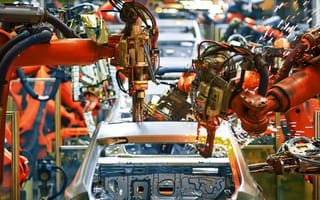Car robotics refers to the use of robots in automotive manufacturing. Major car makers — like Ford, General Motors, Mercedes-Benz and BMW — use cobots (collaborative robots) on their factory floors.
Indeed, car robotics has been vital to the automotive industry for decades, and they’re only going to gain importance as cars and the manufacturing process get smarter. Robots are working alongside humans to perform tasks that range from welding and inserting parts on an assembly line to using lasers to recognize malfunctioning parts of a vehicle.
Uses of Automotive Robotics in Car Manufacturing
- Welding body panels and smaller parts.
- Assembling windshields, wheel mounts, pumps and motors.
- Removing trim and excess material.
- Pouring molten metal to create new parts.
- Quality assurance testing seats and touchscreens.
Automotive robotics as an industry is expected to reach a market value of $13.6 billion by 2027. But despite their popularity, car robots aren’t going to displace humans anytime soon. They are instead collaborative creations designed to maximize efficiency throughout the car-building process. They’ve been doing just that for years. Way back in 2014, humans were reportedly 85 percent more productive working with robots than without them.
With this in mind, let’s take a look at some of the applications and companies behind them powering car robotics.
13 Automotive Robotics Applications to Know
Magna International manufactures automotive components like electronics, seats and driver assistance systems. The company also has experience with robotics, having collaborated with Cartken to manufacture fleets of autonomous delivery robots. The company unveiled its own last-mile delivery robots in 2022, which use hardware and software from automotive tech. These robots decrease carbon emissions and traffic in high density urban spaces.
General Motors is known for making cars — it manufactures the Chevrolet, Buick and Cadillac brands, among others. The company also has a reputation in the robotics community. It partnered with NASA to develop the lunar rover and the Robonaut 2, a humanoid robot designed to assist astronauts on board the International Space Station. That collaboration also led to development of the RoboGlove, assistive robotic technology originally designed for astronauts that can also be used by assembly line workers to help them perform repetitive tasks that involve grasping tools and other objects.
Rockwell Automation relies on car robotics to provide assistance in the body shop — everything from installing parts and painting cars to helping with inventory management and quality control. With an eye toward the future, Rockwell is developing robots that will help automate the manufacturing of electric cars. The company offers different technologies and robots to help scale an electric car factory.
ABB offers cobots as well as automotive robots that work independently without the help of humans. Designed for final assembly, the robots are capable of painting, press automation and flexible framing production. The company is also currently developing robotic solutions for assembling batteries, e-motors and interiors.
Kuka’s extensive line of robots and software automates car-making processes. The company’s software installs into prefabricated robots and can run everything from 3D visualizations to simulations. The 25 automotive robots from Kuka can support massive payloads and perform tasks such as welding, water jet cutting, assembly line inspection and creating seat elements for BMWs using 3D geometry.
FANUC offers a variety of robots designed for use across the car manufacturing process. One popular option among automakers are collaborative arm robots. These robots are compact and operator-friendly without needing to be caged off like traditional robots in car manufacturing. These robots are capable of small part assembly, parts inspection and have two different sizing options.
Acieta is a FANUC-authorized system integrator. This means, on top of offering its own robotics, Acieta keeps FANUC spare parts stocked and its engineers are certified to repair FANUC robots. The company also has certifications for vision specialization.
Yaskawa makes robots for a variety of industries. Its robotics for fully automated assembly use 2D and 3D vision to ensure accuracy within flexible robotic systems. Yaskawa robots can conduct visual inspection, arc and spot welding, material removal and more. It also offers several types of robotic systems including cobots, industrial robotic arms and Motoman Robot Software.
Robotic Vision Technologies creates 3D vision-guided software for robots and cobots. The Single Camera 3D, compatible with every major industrial bot, helps locate and identify different parts of an automobile in less than 0.1 seconds. The robotic visioning helps auto manufacturers increase efficiency through its ability to recognize different automotive parts and send out malfunction alerts.
Epson may be known for printers, but its manufacturing robots have also been used in the automotive industry for more than 30 years. Epson’s car robotics lineup includes systems for small parts that require precise movements like lithium cell battery and transmission linkage assembly as well as bearing production.
Universal Robots created three different cobots that integrate into an automotive production line. Mimicking the movement of a human arm, its robotic arm brings added precision to different parts of car manufacturing. The company’s UX can replace human operators in jobs that are dangerous, dirty or monotonous, freeing up workers to perform more advanced and fulfilling tasks.
Staubli offers a host of automotive robotics, but one of its specialties is the production of interior features and comfort components of cars. The company’s robots can be used for a wide range of interior features from product air conditioning units to testing the comfort of seats and touchscreens.
Piaggio Fast Forward develops robotics and mobility solutions, and its offerings for businesses include the PFF Rider Assistance Solution, a 4D radar-based motorcycle and vehicle safety platform. The modular, customizable technology leverages sensors designed to operate reliably in all weather and lighting conditions and can communicate alerts across dash, mirror and emergency lights. The company has also created the PFF follow module, which can be used to integrate its following technology into any vehicle or robotic platform, and kilo, a four-wheeled robotic flatbed that’s designed to work alongside humans in settings like manufacturing facilities.















